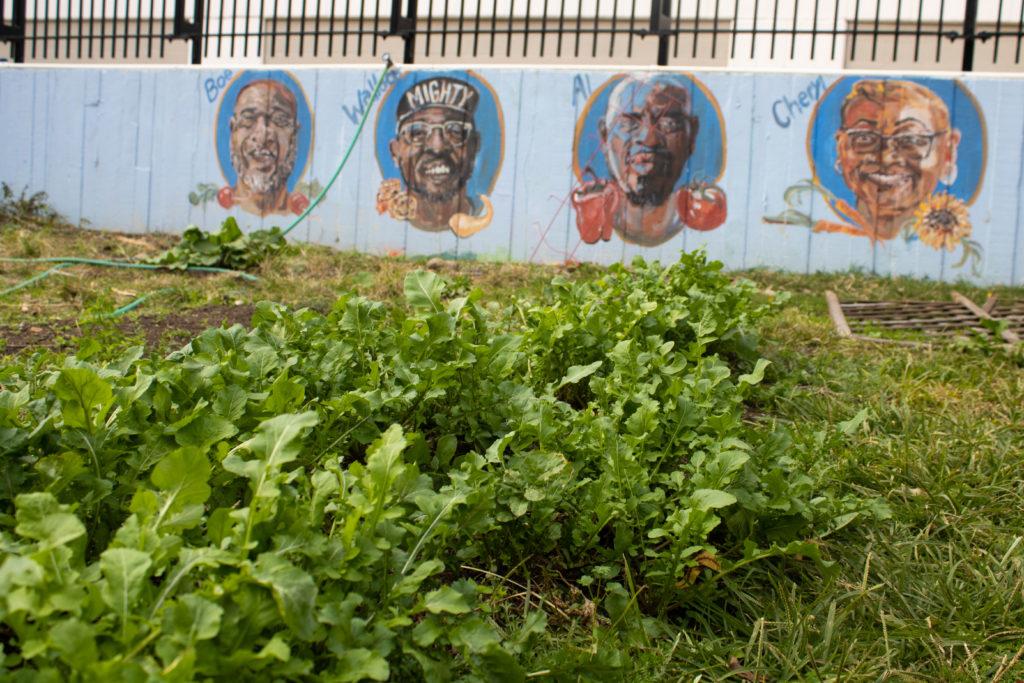For more than a decade, student-volunteers at the GroW Community Garden have harvested hundreds of pounds of fresh produce each year to feed unhoused D.C. residents at Miriam’s Kitchen, a nonprofit organization located inside Western Presbyterian Church on Virginia Avenue.
They grow more than 500 pounds of vegetables each year from a skinny plot of land on H Street between 23rd and 24th streets and deliver produce twice a week, year-round to guests at Miriam’s Kitchen, which provides services like housing subsidy vouchers and a case manager for about 216 previously and currently unhoused individuals. Student volunteers and Miriam’s Kitchen staff said the 13-year partnership has allowed neighbors and students to serve their vulnerable community members while connecting over their love of fresh food.
Kimberly Williams, a stakeholder engagement associate in the Office of Sustainability, said GroW Garden student managers – who oversee community service efforts at the garden – plant certain crops upon request to tailor their harvest to the needs of Miriam’s Kitchen.
“If there is a particular vegetable that is most popular with guests, Miriam’s Kitchen chefs will share that information with the GroW Garden managers, who will do their best to maximize the volume that is grown and donated,” Williams said.
Miriam’s Kitchen works with community partners like Capital Area Food Bank, farmer’s markets, grocery stores, restaurant suppliers and union market artisans to provide healthy five- to six-item meals twice a day to Miriam’s Kitchen guests. The kitchen provides breakfast from 7 to 8 a.m. and dinner from 4 to 5 p.m. Monday through Friday no matter the weather conditions or time of year.
Marcus May, the executive sous chef at Miriam’s Kitchen, said the relationship between Miriam’s Kitchen and GroW Garden has been “fantastic” and “indefinite” with volunteers meeting staff at the kitchen before determining which fruits and vegetables to grow next.
“They grow tomatoes, peppers, squash, zucchini, greens, herbs,” May said. “It’s been pretty consistent with that stuff over the past four years.”
May said Miriam’s Kitchen meets with volunteers and managers to discuss how often to harvest their produce to ensure the garden is providing the freshest food. He said the students at the GroW Garden inspire him through their dedication to their work.
“As long as Miriam’s Kitchen is there, GroW Garden is going to be a part of what we do,” May said. “I mean, the students love what they do, we love getting produce from them and it is a perfect match. So I don’t see anything stopping that any time soon.”
Raneem Atiyeh, one of the co-managers of the GroW Garden and a senior majoring in international affairs, said a “well-rounded” relationship thrives between GroW Garden, Miriam’s Kitchen and the Western Presbyterian Church because members from the church and kitchen will help harvest at the garden while students will volunteer at Miriam’s Kitchen’s events.
“Our volunteers are the backbone of the work we do, and we love being able to build this sense of community on campus,” Atiyeh said.
She said the partnership between the GroW Garden and Miriam’s Kitchen serves as a sustainable, local food system rather than the commonly practiced factory farming that can “deplete” the earth and its nutrients. The World Wildlife Fund reported that nearly half of nutrient-rich topsoil has been depleted in the last 150 years because of conventional mass farming techniques like intensive tilling, lack of cover crops, synthetic fertilizers and pesticide use.
Atiyeh said when managers harvest a surplus of fruits and vegetables, they occasionally donate produce to other meal centers. She said she enjoys building community on campus through student collaboration at the garden, and anyone who wishes to get more involved can do so simply by showing up.
“Sometimes people will just pass us in the street and be like, ‘Oh, how do I become part of this?’” Atiyeh said. “Then we’ll be like, ‘You can just cross the fence right now and join us.’”
Nick Smaldone, the other co-manager at the GroW Garden who is studying international environmental studies and English, said the garden is “sustainable” because volunteers and managers don’t use chemicals, fertilizers or modified seeds to grow food. He said the garden does not source seeds from “agribusinesses” – large agricultural enterprises that sell products like fertilizer, pesticide, food distribution and farming equipment to consumers.
Smaldone said currently or previously unhoused individuals who rely on the kitchen’s food volunteer in the garden, which is an inspirational part of working with Miriam’s Kitchen. He said student volunteers and Miriam’s Kitchen workers exchange sustainable community practices through their interactions at the garden and kitchen.
“On any given day in the garden you can have students working, you could have professors working, you can have just Foggy Bottom neighbors working and you can have people who eat at Miriam’s Kitchen all volunteering at the garden,” Smaldone said.
Smaldone said the garden aims to be both a source of fresh produce and an organization that disseminates information about agriculture and agricultural justice, which promotes fair wages and protection from hazards like chemicals in farming. He said the GroW Garden is trying to “revamp” and increase its social media presence by posting more frequently on its Instagram story to spread awareness about the organization.
“I think that it really changes year to year, even semester and semester, like what direction the garden goes in, even our relationship with our volunteers and Miriam’s,” Smaldone said.







